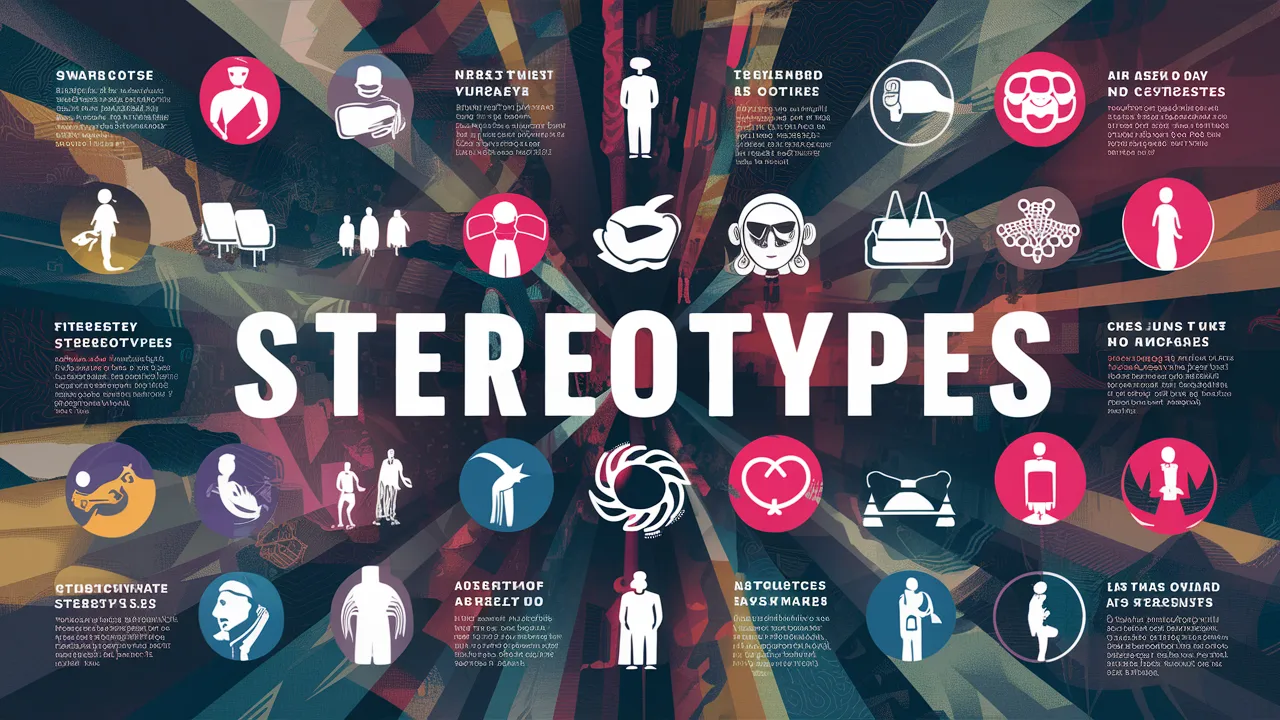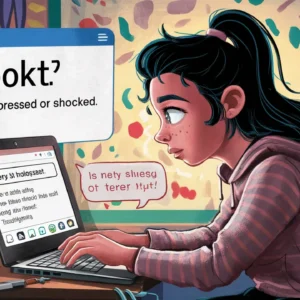A stereotype is a widely held but oversimplified and generalized belief or idea about a particular group of people or things.
In a world adorned with a myriad of colors, shapes, and stories, stereotypes serve as murky filters that skew our perceptions of those around us. Defined by rigid molds and oversimplified caricatures, stereotypes creep into the crevices of our minds like stubborn vines, camouflaging individuality beneath a blanket of assumptions.
Unpacking these societal constructs is not merely an act of peeling back layers but a journey of illumination – revealing the unique tapestry each person weaves in the fabric of society.
As we delve into the labyrinthine depths of stereotypes, it becomes imperative to grasp their intricate nature with open hearts and curious minds. By dissecting these preconceived notions deeply ingrained in cultural narratives, we embark on a quest for understanding beyond surface appearances.
The importance of this exploration extends far beyond personal introspection; it reverberates through societal corridors, shaping the landscape where tolerance blooms and inclusivity thrives.
Our journey begins not with condemnation but with curiosity; seeking to unravel the tangled threads that bind individuals to archaic molds in pursuit of harmonious coexistence.
Dissecting Stereotypes.
Stereotypes have a profound impact on how individuals perceive themselves and navigate the world around them. When individuals internalize stereotypes that align with their identity, it can shape their self-perception and influence their behavior.
For instance, studies have shown that women who are exposed to gender stereotypes portraying them as less capable in certain fields may begin to doubt their own abilities, leading to imposter syndrome in academic or professional settings.
This internalization of stereotypes can hinder personal growth and limit opportunities for individuals to reach their full potential.
Moreover, stereotypes play a pivotal role in shaping group dynamics within communities. When groups are defined by preconceived notions based on race, gender, or other characteristics, it can create barriers to meaningful connections and collaboration.
For example, racial stereotypes perpetuated through generations can lead to segregation and discrimination within society. By dissecting these stereotypes and understanding their origins, individuals can work towards breaking down these barriers and building inclusive environments where diversity is celebrated rather than feared.
The media also plays a significant role in perpetuating and reinforcing stereotypes across various platforms. From outdated portrayals in movies and TV shows to biased news coverage, the media has the power to shape societal perceptions and beliefs.
For instance, stereotypical representations of marginalized communities can further marginalize them by perpetuating harmful narratives that overshadow individual complexities. By critically examining media messages and advocating for more diverse and accurate representations, society can combat the negative impacts of stereotypes on collective mindsets and promote inclusivity.
Unpacking the psychological effects.
Unpacking the psychological effects of stereotypes delves into the intricate mechanisms behind their formation and internalization. Stereotypes often stem from cognitive shortcuts or heuristic processes that simplify information processing, leading individuals to categorize others based on superficial characteristics rather than individual traits.
This categorization not only influences how we perceive others but also shapes our self-perception through internalizing societal expectations associated with particular groups.
For example, gender stereotypes can lead individuals to conform to prescribed behaviors that align with societal norms, affecting personal identity and well-being.
The impact of internalized stereotypes on mental health and well-being is profound, as individuals may experience stereotype threat—anxiety or apprehension about possibly confirming a negative stereotype about one’s group. This can hinder performance in academic or professional settings and contribute to feelings of inadequacy or imposter syndrome.
Additionally, the constant pressure to fit into stereotypical molds can erode self-esteem and create barriers to personal growth and authentic self-expression.
Addressing these negative psychological effects requires empowering individuals to challenge stereotypes by cultivating resilience, promoting self-compassion, and fostering a sense of belonging beyond limiting labels.
To combat the detrimental impact of stereotypes on mental health, empowerment strategies play a crucial role in fostering resilience and dismantling harmful beliefs. Empowerment involves promoting agency within individuals to challenge stereotypical narratives by embracing uniqueness and diversity.
By encouraging critical thinking, promoting positive role models that defy stereotypes, and providing platforms for marginalized voices to be heard, communities can empower individuals to resist the influence of damaging stereotypes on their psyche.
Empowerment also entails creating supportive environments where open dialogue about biases and prejudices can flourish, allowing for introspection and collective efforts towards building a more inclusive society free from discriminatory attitudes.
Societal Ramifications.
Stereotypes wield a profound influence on marginalized communities, exacerbating the existing disparities and hindering progress towards equality. The effects of stereotypes ripple through various facets of society, affecting not only individuals’ perceptions but also institutional practices.
For instance, the stereotype that women are less competent in STEM fields may lead to gender disparities in technology companies, with fewer women being hired or promoted. This illustrates how deeply ingrained stereotypes can perpetuate systemic discrimination by limiting opportunities based on preconceived notions rather than merit.
Furthermore, the link between stereotyping and systemic discrimination underscores the urgency to dismantle these harmful beliefs. Racial stereotypes, for example, not only shape interpersonal interactions but also contribute to discriminatory practices in sectors like law enforcement or hiring processes.
By recognizing and challenging these biases at a societal level, there is an opportunity to dismantle systemic discrimination and create more equitable environments for all individuals. Education plays a crucial role in this endeavor by promoting critical thinking, empathy, and cultural competence among future generations.
In addressing societal stereotypes, education emerges as a powerful tool for fostering inclusivity and challenging harmful prejudices. Schools and universities have the potential to cultivate environments where diversity is celebrated and stereotypes are interrogated.
By incorporating inclusive curricula that highlight diverse perspectives and histories, educational institutions can equip students with the skills necessary to confront stereotypes actively. Moreover, fostering dialogues within educational settings can promote understanding across different backgrounds and counteract divisive narratives that stem from stereotypical thinking.
Through concerted efforts in education, society can begin to unravel the intricate web of stereotypes that perpetuate inequalities and work towards a future grounded in respect and acceptance.
Gender Stereotypes: A Lens into Career Choices.
Gender stereotypes have long played a significant role in guiding individuals towards or away from certain career paths. From the enduring association of women with nurturing and caregiving roles to the stereotype that men are more suited for leadership positions, these ingrained beliefs can shape not only societal perceptions but also individual choices.
For instance, studies have shown how young girls are often subtly encouraged towards fields like nursing or teaching, while boys may be nudged towards science or engineering careers. These subtle nudges influence their perspectives on what they believe they are capable of achieving, ultimately impacting their career decisions.
Challenging traditional gender roles requires a concerted effort to raise awareness about the limitations these stereotypes place on individuals’ potential.
By advocating for equal opportunities and dismantling gender-based biases, society can create a more inclusive environment where individuals feel empowered to pursue their passions irrespective of societal expectations.
Initiatives promoting mentorship programs for underrepresented genders in STEM fields, for example, offer crucial support in breaking down barriers and fostering greater diversity in traditionally male-dominated industries.
Celebrating diversity and championing gender equality serve as potent weapons against harmful stereotypes. Embracing diverse perspectives not only enriches workplaces by encouraging innovation and creativity but also sends a powerful message that talent knows no gender boundaries.
When organizations prioritize inclusivity and actively work towards eliminating biases in recruitment procedures and promotions, they pave the way for a more equitable future where meritocracy reigns supreme over outdated prejudices.
By challenging gender stereotypes at every level of society, we can create pathways for individuals to explore varied career options without fear of judgment based on archaic beliefs.
Racial stereotypes.
Racial stereotypes are ingrained narratives that often shape how individuals perceive and interact with others of different races. By deconstructing these biases, we uncover the profound impact they have on social interactions, contributing to prejudice and discrimination.
For instance, the stereotype of associating certain ethnic groups with criminality can lead to increased scrutiny, suspicion, and even violence towards individuals solely based on their appearance.
Understanding the roots of racial stereotypes is crucial in dismantling them; many stereotypes stem from historical narratives that unfairly depict certain racial groups as inferior or threatening.
Recognizing the historical origins of racial stereotypes unveils their enduring effects on contemporary society. These biases can perpetuate systemic inequalities, impacting access to opportunities in education, employment, and healthcare.
For instance, preconceived notions about intelligence or work ethic based on race can hinder individuals from marginalized communities from achieving success despite their skills and qualifications.
By acknowledging these longstanding prejudices, we bring attention to the urgent need for cultural sensitivity, empathy, and dialogue in combating racial prejudices.
Advocating for cultural sensitivity involves promoting a deep understanding of diverse backgrounds and experiences without relying on harmful generalizations. Empathy plays a crucial role in challenging racial stereotypes by fostering connections based on mutual respect and appreciation for individual uniqueness.
Dialogue becomes a powerful tool in breaking down barriers caused by misconceptions and biases, allowing for meaningful conversations that bridge divides and promote inclusivity.
By encouraging open discussions that prioritize listening and learning from others’ perspectives, we create spaces where racial prejudices can be addressed constructively, leading towards a more just and harmonious society.
Navigating the intricate web of stereotypes.
Navigating the intricate web of stereotypes necessitates a deep dive into the concept of intersectionality. Intersectionality acknowledges that individuals have multiple identities that intersect and impact their experiences uniquely.
When delving into stereotype complexity, it becomes evident that someone’s race can intertwine with other aspects like gender, sexuality, or disability to shape their encounters with bias.
For instance, a Black woman may face distinct stereotypes different from those faced by a White woman or a Black man due to the compounded effects of race and gender intersecting. Understanding these nuanced intersections is crucial in dismantling stereotypes effectively.
By examining how various facets of identity contribute to stereotype experiences, we uncover the layers of discrimination individuals endure within society. An Asian person who identifies as LGBTQ+ might encounter stereotypes related not only to their race but also to their sexual orientation, amplifying the biases they face.
It is essential to promote inclusive spaces that consider and respect these diverse intersections to foster understanding and empathy among communities. For instance, creating safe spaces where individuals can share their unique experiences without judgment allows for deeper connections and dispels misconceptions perpetuated by narrow stereotypes.
Promoting an intersectional perspective not only sheds light on the complexities of stereotypes but also emphasizes the need for inclusivity within societal dialogues. Acknowledging the diverse intersections within communities serves as a powerful tool in challenging ingrained biases and fostering acceptance.
For example, initiatives that highlight stories of individuals who navigate multiple identities provide valuable insights into the multifaceted nature of stereotype experiences, encouraging others to embrace diversity wholeheartedly.
In essence, embracing intersectionality cultivates richer discussions and paves the way for more inclusive societies built on mutual respect and appreciation for differences.
Breaking Stereotypes: A Call to Action.
Empowering individuals to challenge biases is not merely a suggestion but an essential step towards dismantling harmful stereotypes. By fostering empathy and understanding, individuals can actively break the cycle of perpetuating prejudiced beliefs.
For example, in workplace settings, promoting diversity training that encourages employees to engage in open dialogue and share experiences can humanize issues surrounding stereotypes. This human-centered approach shifts perceptions from abstract notions to real-life stories, triggering empathy that transcends preconceived notions.
Encouraging active participation in initiatives that promote diversity awareness is a tangible way to combat stereotypes at both individual and collective levels. Take, for instance, community-driven projects where volunteers immerse themselves in different cultures or identities through workshops and events.
These initiatives not only educate participants but also offer firsthand experiences that challenge existing stereotypes. By actively engaging with diverse perspectives, individuals can broaden their understanding and contribute to a more inclusive society.
Personal narratives serve as powerful tools for debunking harmful stereotypes by providing authentic accounts that defy ingrained biases. When individuals share their stories openly, it creates a ripple effect that challenges misconceptions and fosters connections based on shared humanity rather than divisive labels.
For instance, platforms that amplify marginalized voices allow for impactful storytelling that reshapes societal attitudes towards stereotyped groups. Through the power of personal narratives, individuals can reclaim their narratives and reshape the narrative landscape towards greater acceptance and appreciation of diversity.
Pathway to Change.
To pave the way for a society free from the shackles of stereotypes, it is imperative to implement strategies that foster inclusive environments devoid of prejudicial judgments. One effective approach involves promoting diverse representation across various platforms, be it in media, workplaces, or educational institutions.
By showcasing a broad spectrum of voices and perspectives, individuals are exposed to a rich tapestry of experiences that challenge traditional stereotypes.
For instance, initiatives like mentorship programs where individuals from marginalized groups are paired with leaders in their fields can break down barriers and highlight talents often overlooked due to stereotypes.
Education stands as a cornerstone in the fight against ingrained stereotypes. By incorporating diverse perspectives into curricula and promoting cultural competency training for educators at all levels, we can equip future generations with the tools to address biases head-on.
Moreover, fostering open dialogue within communities through workshops, seminars, and town hall meetings encourages mutual understanding and empathy. These interactions serve as platforms for individuals to share their personal stories and challenges stereotypes by showcasing the multifaceted nature of identity.
Driving social change requires collaborative efforts that span beyond individual actions. Communities must band together with institutions and policymakers to enact meaningful changes that combat harmful stereotypes systematically.
This collaboration could involve advocating for policies that promote diversity and inclusion in workplaces or pushing for legislation that protects against discrimination based on race, gender, or other identity markers.
By aligning forces towards a common goal, society can dismantle entrenched stereotypes and create an environment where every individual is seen and valued for their unique contributions without prejudice or bias.
Embracing Diversity: Paving the Path Towards a Unified Society.
As we reflect on the intricate web of stereotypes that thread through our social fabric, it becomes evident that dismantling these constructs requires a collective commitment to understanding and action.
Our journey through unraveling stereotypes has emphasized the profound impact they wield on individuals, communities, and societal structures. By challenging preconceived notions and fostering a culture of inclusivity, we set forth on a transformative path towards a more equitable and harmonious society.
In the tapestry of diversity lies the key to dismantling prejudices and nurturing empathy. By embracing varied perspectives, celebrating individual uniqueness, and advocating for equality in all facets of life, we lay the foundation for a brighter future free from the constraints of stereotypical judgments.
Let us continue to empower one another through education, dialogue, and representation, as we stride forward hand in hand towards a world where respect and understanding flourish abundantly. Together, let us forge ahead with unwavering resolve to weave a new narrative—one defined by unity in diversity and boundless compassion.



